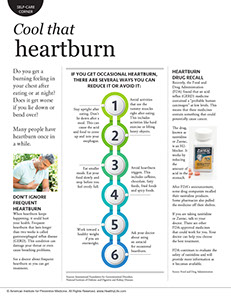SYMPTOM CHECKER
CONDITIONS
Male
Female
Child
Arm, Hand & Shoulder Concerns
Legs & Feet Concerns
Dental & Mouth Concerns
Ear & Nose
Eye Conditions
Head Conditions
Arm, Hand & Shoulder Concerns
Legs & Feet Concerns
Front
Back
Arm, Hand & Shoulder Concerns
Dental & Mouth Concerns
Ear & Nose
Eye Conditions
Head Conditions
Arm, Hand & Shoulder Concerns
Dental & Mouth Concerns
Ear & Nose
Eye Conditions
Head Conditions
Front
Back
Arm, Hand & Shoulder Concerns
Neck Links
Head & Neck Concerns
Arm, Hand & Shoulder Concerns
Neck Links
Head & Neck Concerns
Front
Back
Online Clinic
Wise Healthcare
Cool that heartburn

Print on Demand
Do you get a burning feeling in your chest after eating or at night? Does it get worse if you lie down or bend over?
Many people have heartburn once in a while.
Don’t ignore frequent heartburn
When heartburn keeps happening, it could hurt your health. Frequent heartburn that lasts longer than two weeks is called gastroesophageal reflux disease (GERD). This condition can damage your throat or even cause breathing problems.
See a doctor about frequent heartburn so you can get treatment.
If you get occasional heartburn, there are several ways you can reduce it or avoid it:
• Stay upright after eating. Don’t lie down after a meal. This can cause the acid and food to come up and into your esophagus.
• Avoid activities that use the tummy muscles right after eating. This includes activities like hard exercise or lifting heavy objects.
• Eat smaller meals. Eat your food slowly and stop before you feel overly full.
• Avoid heartburn triggers. This includes caffeine, chocolate, fatty foods, fried foods and spicy foods.
• Work toward a healthy weight if you are overweight.
• Ask your doctor about using an antacid for occasional heartburn.
Heartburn drug recall
Recently, the Food and Drug Administration (FDA) found that an acid reflux (GERD) medicine contained a “probable human carcinogen” at low levels. This means that these medicines contain something that could potentially cause cancer.
The drug, known as ranitidine or Zantac, is an H2-blocker. It works by reducing the amount of acid in the stomach. After FDA’s announcement, some drug companies recalled their ranitidine products. Some pharmacies also pulled the medicine off their shelves.
If you are taking ranitidine or Zantac, talk to your doctor. There are other FDA-approved medicines that could work for you. Your doctor can help you choose the best treatment.
FDA continues to evaluate the safety of ranitidine and will provide more information as it becomes available.
Source: Food and Drug Administration
This website is not meant to substitute for expert medical advice or treatment. Follow your doctor’s or health care provider’s advice if it differs from what is given in this guide.
The American Institute for Preventive Medicine (AIPM) is not responsible for the availability or content of external sites, nor does AIPM endorse them. Also, it is the responsibility of the user to examine the copyright and licensing restrictions of external pages and to secure all necessary permission.
The content on this website is proprietary. You may not modify, copy, reproduce, republish, upload, post, transmit, or distribute, in any manner, the material on the website without the written permission of AIPM.
2021 © American Institute for Preventive Medicine - All Rights Reserved. Disclaimer | www.HealthyLife.com















































